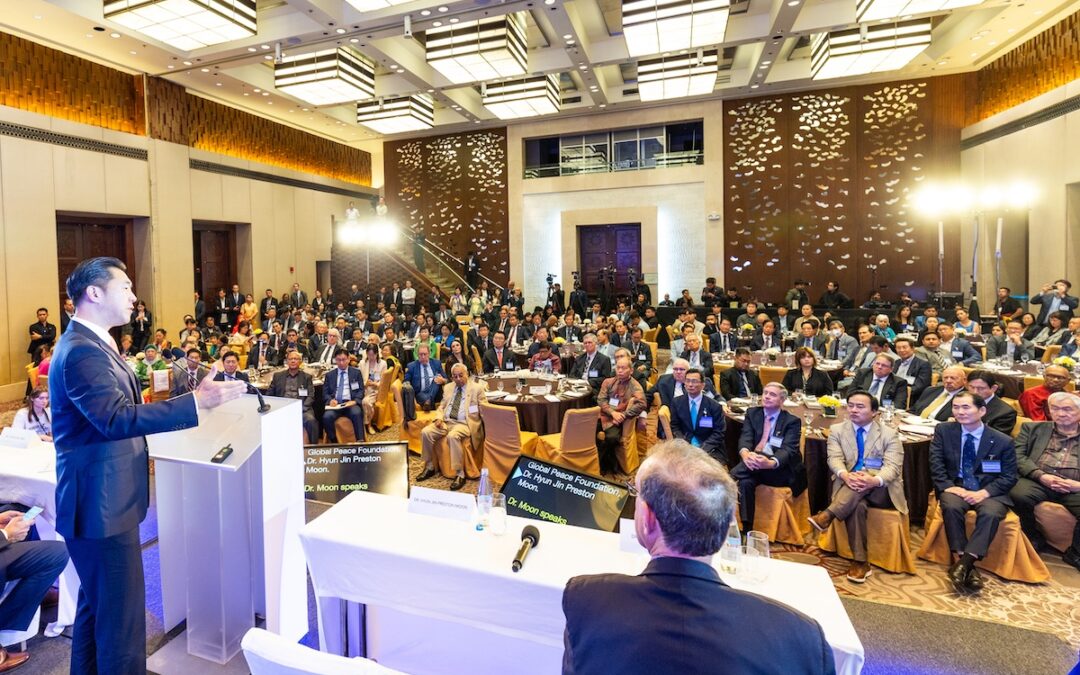The Korea Times published an interview with Dr. Hyun Jin Preston Moon during the Global Peace Convention 2023 held in Manila, Philippines. You can read the article below or the original version in full at the following link.

MANILA, Philippines – “A dream as a concept means nothing, but if people take ownership over that dream, that’s where change comes about.”
Hyun Jin Preston Moon, founder and chairman of the Global Peace Foundation (GPF), a non-profit organization, stressed the importance of the youth and a sense of ownership by each individual to bring peace and unification to the divided Korean peninsula.
The chairman, who founded the organization in 2009 to promote inclusive peacebuilding worldwide, has forged his way into Korea’s unification movement, launching a coalition called Action for Korea United (AKU) in 2012. The coalition brings together about 1,000 non-governmental organizations in Seoul to raise awareness and present a vision for the unification of the two Koreas, particularly among younger generations.
Noting that the younger generations could play crucial roles in solving the unification issue, Moon expressed concerns over how disinterested they are in the issue despite their potential to influence change.
“Young Korean people need to come out of their slumber. I realize that they have been misinformed in many ways, but I’m going to provide you the opportunity to know the truth and the solution to make your future better and brighter,” he said during an interview with The Korea Times at Manila Marriott Hotel in the Philippines, on Dec. 14.
“The young generation has a special opportunity in history where they can fulfill the unfulfilled dreams of their grandparents and their parents and be the architects of developing and building a new nation; a new nation that can live or strive to live up to the tremendously noble ideas … If the Korean young people can take ownership of it, believe me, this works.”
He explained that the widely-held notion that unification will bring about devastating aftershocks to the Korean peninsula is a miscoception caused by misinformation.
“There are so many models of successful transition and successful development that many academics have not really brought into the discussion. I will start to bring them in, but then it’s really up to the media to give that truth to the young people,” Moon said.
“So they realize that when I think about my future and I think about the challenges here in South Korea, instead of complaining about it, I can do something about it. Because unification will solve all the issues that I’m currently facing. Unification should be the issue of young people.”
Citing the current economic issues in the country, he added that once the younger generations are properly educated, they will come to understand that unification could provide solutions.

“The birth rate (in South Korea) is so low that you have fewer employees and yet you still have such a high unemployment rate that’s a huge indictment on the South Korean economy … You need to create greater incentives for people to participate in capital creation. That’s what’s going to build the engine of growth,” he said.
“If young people really understand the truth and the implications of unification, I know that they will be the greatest advocates for unification because it’s about their future.”
Moon’s 2016 book, “Korean Dream: A Vision for a Unified Korea,” presents his “Korean Dream” framework towards the practical process of reunification, laying out his prospect for a peaceful and united Korea.
In the book, he emphasizes Korea’s deep-rooted ideology of “Hongik ingan,” which means to broadly benefit all humankind.
“It’s not just about money at the end of the day, but it’s about living for something higher, something that is worth living for a higher purpose. Unification is a moral issue. It’s a human rights issue; a reflection on the Korean people in Korean character that we are allowing this to happen, especially people in the South, who are well-to-do and wealthy,” he said, adding the ideology should be reminded again to bring people together.
“Korea was divided by the ideology of the Cold War, but now in Korean society, it’s divided by many different factors … That’s why I emphasize the importance of Korean identity and that identity comes from our 5,000 years of history, especially the ‘Hongik ingan’ providential mandate that the Korean people create an ideal nation that can be the inspiration for all of humanity.”

